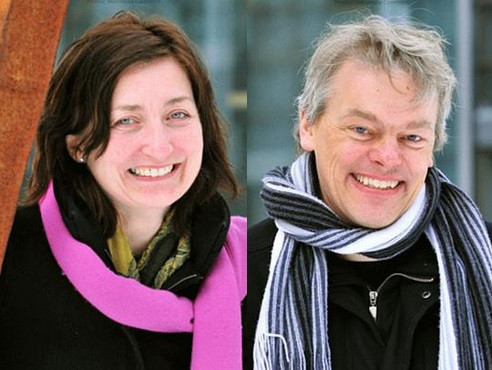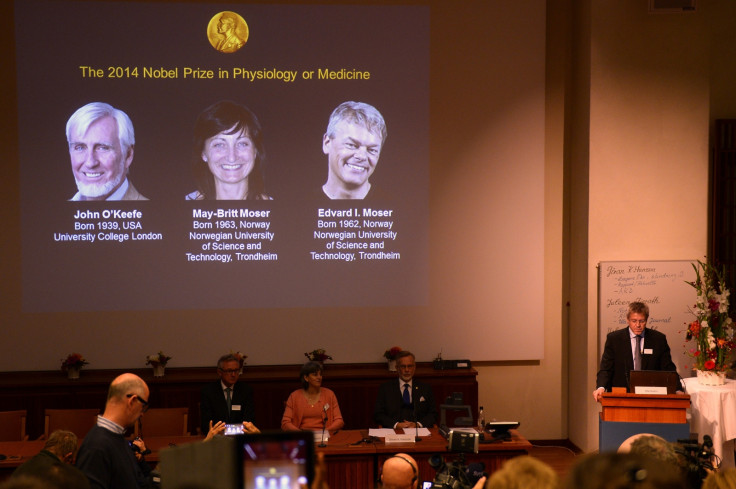Nobel Prize 2014: John O'Keefe, May‐Britt Moser and Edvard Moser Win Physiology or Medicine Award

John O'Keefe, May‐Britt Moser and Edvard Moser have been jointly awarded the 2014 Nobel Prize for Physiology or Medicine.
One half of the prize was awarded to O'Keefe, while the other went to wife and husband team May‐Britt and Edvard Moser.
The award recognised the three scientists' work in discovering cells that "constitute a positioning system in the brain".
#nobelprize2014 Medicine: ½ to American and British John O’Keefe, @uclnews pic.twitter.com/t8uHzh7LfZ
— The Nobel Prize (@NobelPrize) October 6, 2014"How do we know where we are? How can we find the way from one place to another? And how can we store this information in such a way that we can immediately find the way the next time we trace the same path?
"This year´s Nobel Laureates have discovered a positioning system, an 'inner GPS' in the brain that makes it possible to orient ourselves in space, demonstrating a cellular basis for higher cognitive function," a statement from Nobel said.
O'Keefe discovered a type of nerve cell in the hippocampus in 1971 that was activated when rats were in a certain place in a certain environment.
"O'Keefe [was] fascinated with brain behaviours. Late 60s addressed problem nerve activity in rats," said Göran Hansson, announcing the award.
#nobelprize2014 Medicine: ¼ to Norwegian @MayBrittMoser @NTNU pic.twitter.com/FNKBJloiW4
— The Nobel Prize (@NobelPrize) October 6, 2014The scientists concluded that the activity in the hippocampus created an inner map of the environment – if the rat went somewhere new, a different combination of cells was created.
The Mosers became the fifth husband and wife team to be awarded a Nobel Prize. They discovered another component of the brain's positioning system. They found grid cells that build up patterns that shift according to environments, allowing us to keep track of where we are.
May-Britt Moser said: "I'm still in shock. This is so great."
Explaining the decision to award the scientists the prize, organisers said: "The discoveries of John O´Keefe, May-Britt Moser and Edvard Moser have solved a problem that has occupied philosophers and scientists for centuries – how does the brain create a map of the space surrounding us and how can we navigate our way through a complex environment?
#nobelprize2014 Medicine: 1/4 to Norwegian Edvard Moser pic.twitter.com/UPGv5z0rLI
— The Nobel Prize (@NobelPrize) October 6, 2014"The sense of place and the ability to navigate are fundamental to our existence. The sense of place gives a perception of position in the environment. During navigation, it is interlinked with a sense of distance that is based on motion and knowledge of previous positions.
"The discovery of the brain's positioning system represents a paradigm shift in our understanding of how ensembles of specialised cells work together to execute higher cognitive functions. It has opened new avenues for understanding other cognitive processes, such as memory, thinking and planning."
Nomination for the Nobel Prize in Physiology or Medicine is by invitation only and this year 263 scientists were up for the award. Of these, 46 had been nominated for the first time.

The prize is awarded for a discovery of major importance in life science or medicine: "Discoveries that have changed the scientific paradigm and are of great benefit for mankind are awarded the prize, whereas life time achievements or scientific leadership cannot be considered for the Nobel Prize," organisers said.
The winner was selected by the Nobel Committee, which evaluated the nominations before the final decision was made by the Nobel Assembly at Karolinska Institutet in October.
Previous winners include Sir Alexander Fleming for discovering penicillin and Robert Koch, for his work on tuberculosis.
© Copyright IBTimes 2025. All rights reserved.






















